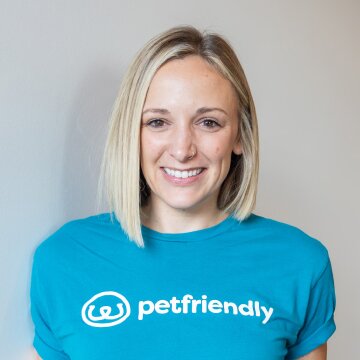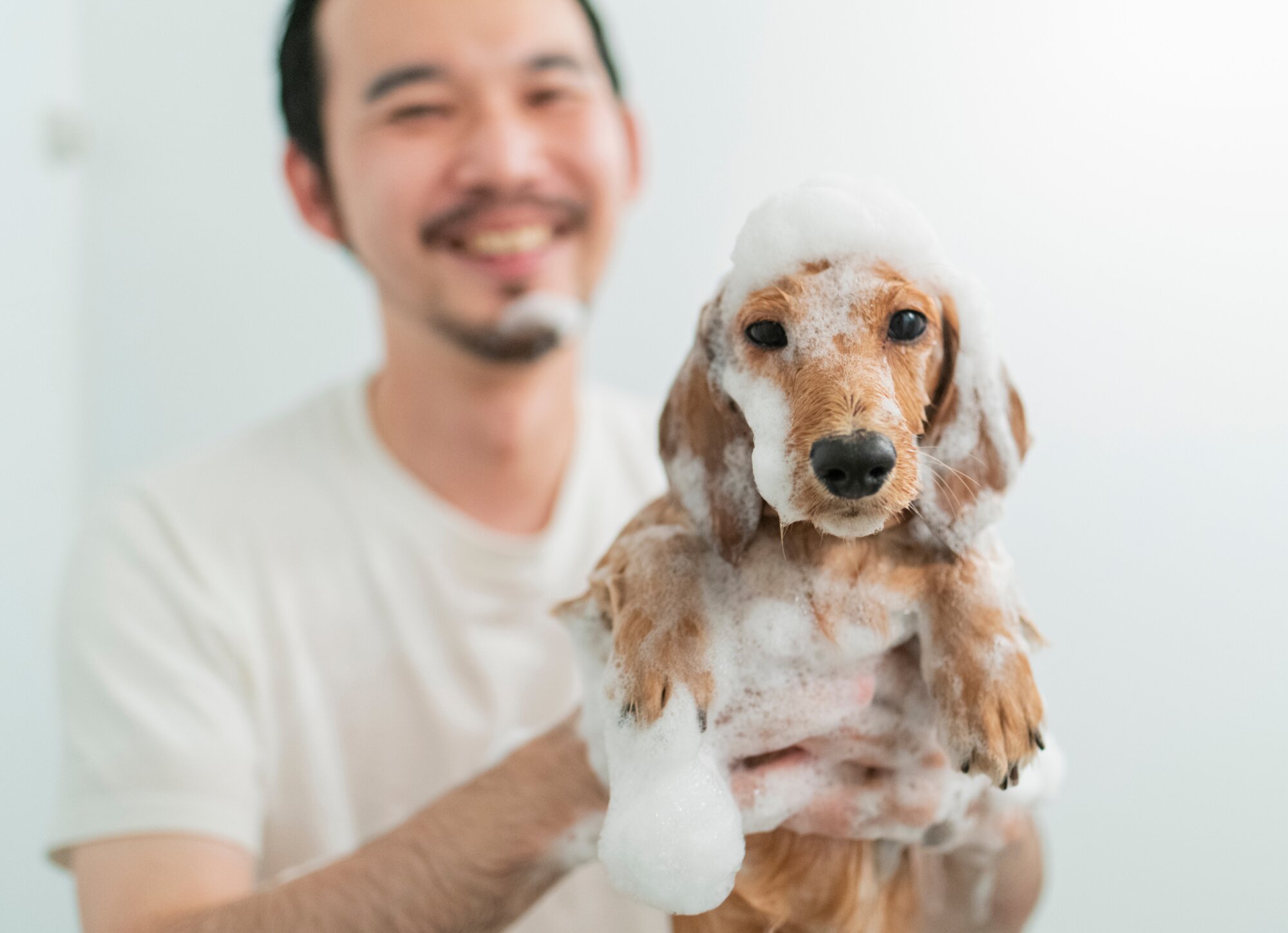You've probably seen the commercials more than a handful of times: Wildlife submerged in oil spills are cleaned with the gentle suds of Dawn dish soap. And you've probably wondered, "Can I wash my dog with Dawn dish soap?"
The truth is, while Dawn dish soap is safe to use on animals, it is not a long-term solution for treating fleas or cleaning your pets.
In this article, we'll break down:
- What is Dawn dish soap
- Is Dawn dish soap safe
- How to choose the right shampoo
- What's the best shampoo for dogs
What is Dawn dish soap
 Dawn dish soap is a brand of dish detergent designed to remove oil, grease, and other hard-to-remove substances. Dawn is great for washing dishes, surfaces, and clothes.
Dawn dish soap is a brand of dish detergent designed to remove oil, grease, and other hard-to-remove substances. Dawn is great for washing dishes, surfaces, and clothes.
Degreasing liquid soap is made with water, cleaning agents, and other ingredients that help clean and remove soil and bacteria. Each ingredient has a specific use:
- Water: Helps dissolve dirt and grime
- Cleaning agents: Surround and breakdown objects like grease
- Antibacterial agents: Decrease bacteria on the skin
Dawn dish soap is one of the most popular dishwashing liquids. When wild animals get stuck in an oil spill, volunteers worldwide use Dawn soap to cut through the muck leaving the animals clean and on their way.
Is Dawn dish soap safe
 Dawn soap has a variety of uses, from defogging eyeglasses to getting rid of fleas. But, is it safe to use on dogs and cats?
Dawn soap has a variety of uses, from defogging eyeglasses to getting rid of fleas. But, is it safe to use on dogs and cats?
The good news is that Dawn in small doses is safe for dogs and cats. However, it should not be used on puppies or kittens.
Dawn shouldn't be used as a regular dog shampoo for a maintenance wash. It can be very drying causing itchy, irritated skin.
If you're dealing with a flea infestation, one of the first steps is to bathe your dog with a degreasing liquid soap. This helps remove adult fleas and flea dirt in your dog's coat.
Then, pet parents can apply a topical flea and tick treatment 24 to 48 hours after bathing to prevent fleas from returning. Dawn soap should not be used to prevent fleas.
Why Dawn isn't good for flea prevention
In a pinch, Dawn can work well to remove the skunk smell or rinse off a muddy adventure. While it's a common remedy for fleas, be careful using it as prevention.
Here's why:
1. It strips the natural oils in your dog's skin.
Dish detergent's job is to break down and remove grease. This will remove the natural oils in your dog's skin and cause dryness — leading to itchy skin.
2. It's drying and can irritate skin.
If your dog has a skin condition or is prone to skin allergies, Dawn or other dish soap varieties will only make your dog's skin itchier and more irritated.
3. It only removes adult fleas and flea dirt.
Dawn only removes the pests and debris on your dog's coat. It does not prevent fleas or keep them from coming back. To tackle the entire flea life cycle, use a monthly flea and tick treatment with ingredients that kill and prevent all types of parasites.
How to choose the right shampoo for your dog
 There are lots of doggy shampoo products on the market, which can make it difficult to find the right one for your furry friend. Most pet parents can relate to being in desperate need of a quick solution when their dogs just rolled around in the smelliest item in the yard they could find.
There are lots of doggy shampoo products on the market, which can make it difficult to find the right one for your furry friend. Most pet parents can relate to being in desperate need of a quick solution when their dogs just rolled around in the smelliest item in the yard they could find.
Here are some qualities to look for when picking out a dog shampoo:
1. It's made with safe ingredients.
Your pup's shampoo (and conditioner) should contain safe ingredients that keep their coat healthy and shiny — and be okay if it gets in your dog's eyes.
In the same way, humans want the products they use to be safe and effective, your dog's shampoo should too. Here's what to look for and avoid:
Things to look for:
- Aloe vera
- Oatmeal
- Coconut oil
- Tea tree oil*
- Vitamin E
Things to avoid:
- Artificial colors
- Artificial fragrances
- Dyes
- Harsh chemicals
- Parabens
- Preservatives
- Sulfates
*Be mindful of shampoos that contain essential oils. Some can be toxic for dogs.
2. It fits their coat type.
Dogs come in all shapes and sizes. From curly to coarse, every dog has unique needs for baths.
If you regularly bathe your dog, you'll want a product designed for their skin and coat. If your dog is long-haired or curly-coated they may need conditioner on top of their regular shampoo.
3. It keeps your dog's skin and coat healthy.
Most dogs will benefit from shampoos made with aloe vera or coconut oil. These ingredients help hydrate the skin's natural oils so their fur is shiny and healthy.
Dry, itchy coats may need relief with oatmeal-based shampoos. Oily coats may be overproducing, making their skin greasy, because they lack hydrated skin and need a shampoo that is pH-balanced.
 Bathing Your Pet
Bathing Your Pet
If you're not sure where to start, ask a groomer or veterinarian for a sample to try at home. Then, bathe your dog following these steps:
- Dilute the sample in water (bonus: add a little white vinegar for even more shine).
- Rinse your dog with warm water, soaking their entire body.
- Scrub the mixture into your dog's fur, getting down to their skin and scalp.
- Rinse the suds and dirt off your pup and pat dry with a microfiber towel.
- After washing your dog, use a blow dryer on a low setting to dry their fur.
- Wait a week, watch for symptoms, and see if it's a good fit.
What's the best dog shampoo
 The best shampoo for dogs is one that's made for them. Human skin and hair are different from a dog's. So while it might be tempting to dollop some baby shampoo on your pet in a bind, there are some reasons they have their designated shampoos and conditioners.
The best shampoo for dogs is one that's made for them. Human skin and hair are different from a dog's. So while it might be tempting to dollop some baby shampoo on your pet in a bind, there are some reasons they have their designated shampoos and conditioners.
Consider these factors when choosing your dog's regular bathing suds:
- Age: Puppies may need more sensitive varieties than older dogs.
- Climate: If you live in a dry climate, your dog may need something more hydrating.
- Coat texture: Long-haired dogs may need a product with de-shedding properties.
- Coat color: If your dog has light-colored fur, you'll want to avoid products with dyes.
- Allergies: Allergy-prone pups may need products that reduce inflammation and redness.
- Health conditions: If your dog has fleas, regular shampoo will not work.
Picking the Best Product
Not sure which product is best for your dog? Chat with your veterinarian or a professional groomer to find the appropriate shampoo for your pup.


